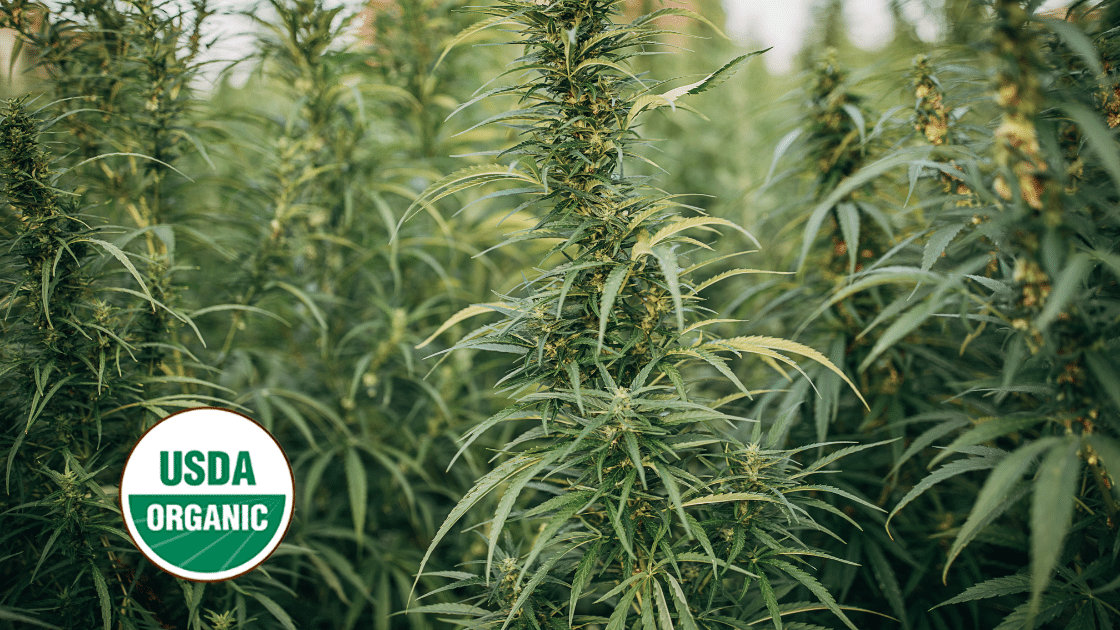When shopping for groceries, you’ve probably noticed the USDA certified organic logo on a number of products at the store, and maybe even most of the products you usually buy are organic. Nowadays, consumers tend to choose organic products over non-organic products as they’re marketed as being healthier. As with many other products on the store shelves today, you can also purchase USDA certified organic CBD oil. But what conditions need to be met for a CBD product to be classified as organic CBD?
In this article, we’ll give you the main differences between organic and non-organic CBD with a focus on USDA certified organic CBD oil as the most popular cannabidiol product today. We’ll also discuss whether it really makes a difference if you purchase USDA organic CBD or not, so keep on reading.
What Is Organic CBD?
You may be wondering what exactly classifies as a certified organic CBD oil since it’s not extracted traditionally like hemp oil is. Similar to organic fruits and vegetables, organic hemp is held to a higher standard.
First, the hemp is grown without pesticides and it’s separated from non-organic hemp after harvesting. Furthermore, for hemp to be certified as organic, it needs to be grown under specific conditions determined by the U.S Department of Agriculture. For example, the soil where organic hemp crops are grown can’t be treated with pesticides for three years before growing organic hemp there, and no additives can be added throughout the growing process.
In order to improve the quality of the soil, cultivators do crop rotations and use naturally-sourced fertilizers. Buying organic CBD also means that the seeds used to grow the hemp aren’t genetically modified seeds. Finally, once all the crops are harvested, the organic crops need to be kept separately from the non-organic ones to prevent cross-contamination.
Organic CBD vs Non-Organic
There are a few factors that differentiate organic CBD from non-organic CBD.
- Certified organic CBD is made naturally from start to finish, while the cultivation of regular CBD allows the use of pesticides, genetically modified organisms, and synthetic fillers.
- Organic CBD has more vitamins and minerals compared to regular CBD since the GMOs, fertilizers, and pesticides drain the soil of some nutrients. And once you extract the CBD oil from the organic hemp plant, the final product has a broader spectrum of cannabinoids.
- CBD that’s grown organically has a lower environmental footprint compared to non-organic CBD, since the natural farming substances aren’t harsh to the environment and also don’t harm wildlife.
- Organic farming supports a necessary level of biodiversity since it doesn’t kill the good nor the bad bugs.
When Hemp Became Certifiable for Organic Status
Even though there have been USDA organic labels on food for years, the organic status on hemp plants has only been applied recently. After the passing of the 2018 Farm Bill, CBD-grade hemp could finally be labeled as organic. This meant that cultivators who decided to grow organic hemp needed to meet the federal standards outlined by the U.S. Domestic Hemp Production Program.
Keep in mind that the most important part of cultivating organic hemp plants isn’t only keeping them pesticide-free during the growing stages, but also processing them as naturally as possible when extracting the CBD oil. In order to extract as much of the cannabinoids from the plant and prevent compromising your final product with synthetic fertilizers and pesticides, use the CO2 extraction process because it’s the most effective and the safest.
How CBD Brands Gain Organic Certification
To be able to sell your CBD oil as USDA certified organic CBD oil, you’ll need to gain an organic status. As we’ve mentioned above, the extraction process is also important for gaining an organic certification as well as using USDA organic certified ingredients in the process, such as USDA certified carrier oils. Two of the most popular extraction methods are lipid extraction and CO2 extraction.
The lipid extraction process includes applying pressure and heat in order to encapsulate the plant compounds into a fat source such as MCT oil, olive oil, or coconut oil without the use of harsh chemicals. The CO2 extraction pulls CBD from the hemp plant by using pressurized CO2 which acts as a solvent at some temperatures, but is a better method than using solvents as the final product doesn’t contain any solvent which isn’t always the case with a solvent extraction method (some solvent can linger in the final product if incorrectly extracted).
Why Is a USDA Organic Certification a Good Idea?
Manufacturing a USDA certified organic CBD oil isn’t only a good idea in terms of the quality of the final product and the number of cannabinoids that you'll get, but it’s also beneficial for the quality of the soil and minimizing the chances of soil erosion.
The organic certification will also help you spread awareness about the many benefits of organic products both by leveraging the positive environmental effects as well as the quality of the soil where the hemp is grown. Moreover, the third-party verification of purity and quality will further increase the value of your product compared to other products on the market.
Final Thoughts
Similar to how purchasing USDA-certified organic foods will be proof of their good quality, so will buying certified-organic CBD oil.
If you want to try out some CBD products made from organically grown hemp that not only have a larger amount of cannabinoids compared to non-organic ones, but may also be healthier for you, you can visit the Nuvita CBD store for more information. Due to the fact that USDA-certified organic CBD oil doesn’t contain pesticides, genetically modified organisms, or synthetic filler, it’s a great step in the right direction for anyone who wants to get the most out of the CBD products they consume.



Leave a comment
This site is protected by hCaptcha and the hCaptcha Privacy Policy and Terms of Service apply.